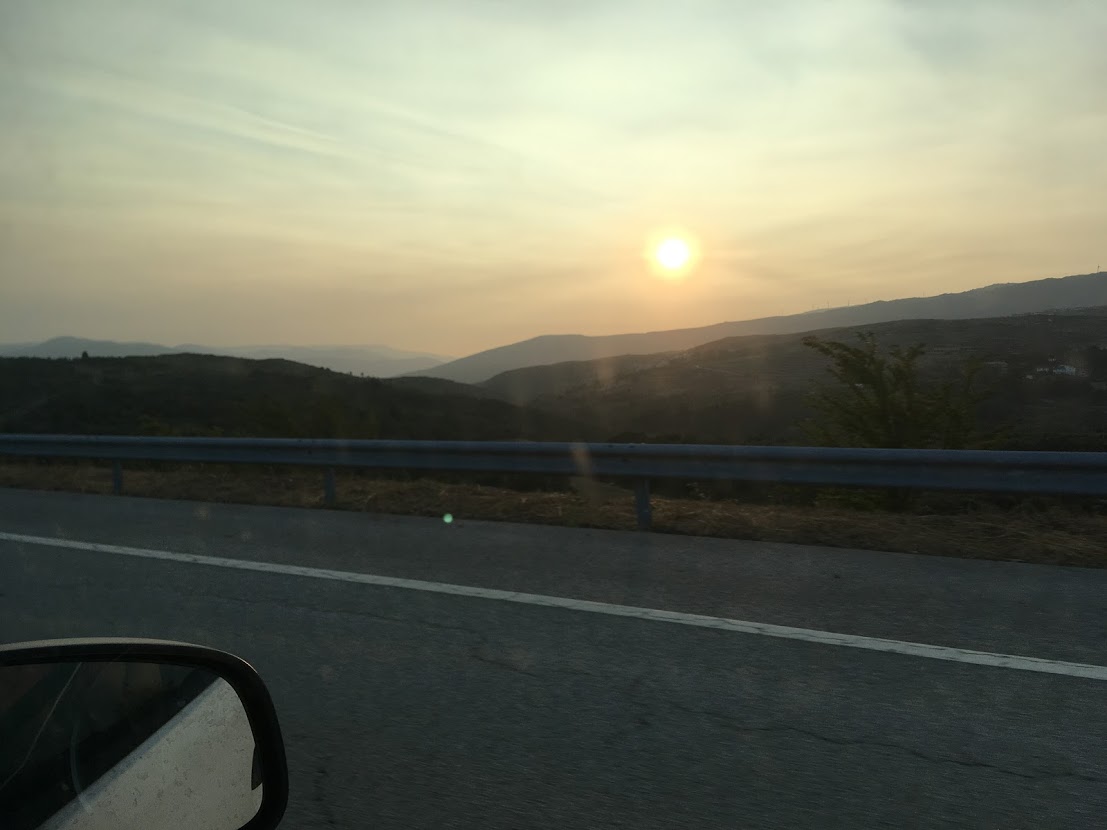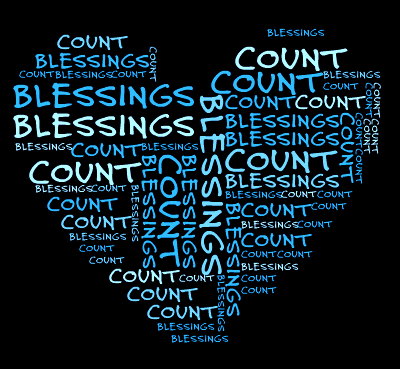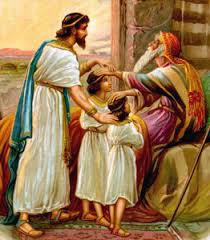Just before his death, Jacob calls his sons and blesses them. We know how important his father’s blessing was to him when he was young; so much so, that he – and his mom – made sure he gets it rather than his brother Esau. We might expect the grown Jacob to have learned his lesson and show us the best “blessing giving” in history. However, we are confronted with verses like:
“Reuven, you are my first-born, my might, and the first-fruits of my strength… unstable as water… you have ascended your father’s bed; then defiled it… Shimon and Levi… cursed be their anger for it was fierce, and their wrath for it was cruel; I will divide them in Jacob, and scatter them in Israel.” (Genesis 49:3-7). What is blessing and what does it mean “to bless” someone? Shouldn’t a blessing be ‘I wish you the best?’
לפני מותו, יעקב קורא לבניו ומברך אותם. אנחנו יודעים עד כמה ברכת אביו הייתה חשובה לו כשהיה צעיר; עד כדי כך שהוא – ואמו – הבטיחו שהוא יקבל אותה ולא אחיו, עשו. יכולנו לצפות שיעקב הבוגר ילמד את הלקח ויראה לנו איך נראית “הענקת הברכה” הטובה ביותר בהיסטוריה. עם זאת, אנו ניצבים מול פסוקים כמו: “רְאוּבֵן֙ בְּכֹ֣רִי אַ֔תָּה כֹּחִ֖י וְרֵאשִׁ֣ית אוֹנִ֑י יֶ֥תֶר שְׂאֵ֖ת וְיֶ֥תֶר עָֽז׃ פַּ֤חַז כַּמַּ֙יִם֙ אַל־תּוֹתַ֔ר כִּ֥י עָלִ֖יתָ מִשְׁכְּבֵ֣י אָבִ֑יךָ אָ֥ז חִלַּ֖לְתָּ יְצוּעִ֥י עָלָֽה׃ שִׁמְע֥וֹן וְלֵוִ֖י אַחִ֑ים כְּלֵ֥י חָמָ֖ס מְכֵרֹתֵיהֶֽם׃ אָר֤וּר אַפָּם֙ כִּ֣י עָ֔ז וְעֶבְרָתָ֖ם כִּ֣י קָשָׁ֑תָה אֲחַלְּקֵ֣ם בְּיַעֲקֹ֔ב וַאֲפִיצֵ֖ם בְּיִשְׂרָאֵֽל”… (בראית מט:3-7). מהי ברכה ומה פירוש “לברך” מישהו? האם ברכה לא צריכה להיות ‘אני מאחל לך את הטוב ביותר?’
The Torah has different blessings: G-d blesses people and the world; People also pronounce a blessing that includes G-d; and people bless each other (mostly parents bless their children, but surprisingly in this portion, Jacob also blesses Pharaoh).
לתורה יש ברכות שונות: אלוקים מברך אנשים ועולם; אנשים מברכים אחרים בברכה הכוללת את אלוקים; ואנשים מברכים זה את זה, בעיקר הורים מברכים את ילדיהם, אך באופן מפתיע בפרשה זו, יעקב מברך גם את פרעה.
Rabbi Hirsch of the 19th century, a genius in conducting thorough “root-canals” on Hebrew roots, teaches that b.r.ch – the root for bracha, blessing – has to do with “power growth”, “spur prosperity”. He connects therefore 2 other Hebrew words that superficially look unrelated. These are the words berech, knee, and brecha, pool, reservoir. The knee is the power point joint, the limb that propels us, that makes us go down or jump to new heights. From here, we have the verb lehavrich, as in to settle down camels, or bow down in prayer, which is close to kneeling. A pool likewise is a place from which one can recharge and draw strength. Rav Hirsch further connects it to other verbs like barak – a separate flash of lightening; and all the verbs that start with peh.resh and have to do with getting out on one’s own, developing, flowering and also getting wild.
הרב הירש שחי במאה ה -19, גאון ב”טיפולי שורש” יסודיים בענין שורשים עבריים, מלמד כי השורש לברכה, ב.ר.כ. קשור ל”צמיחת כוח “,” לעודד שגשוג “. לכן הוא מחבר שתי מילים עבריות אחרות שנראות על פניו כלא קשורות. אלה המילים ברך (ברגל) ובריכה (מאגר מים). הברך היא מפרק נקודת הכוח, האיבר שמניע אותנו, שגורם לנו לרדת נמוך או לקפוץ לגבהים חדשים. מכאן יש לנו את הפועל להבריך, להושיב גמלים, או להשתחוות בתפילה, שקרובה לכריעה. בריכה היא גם מקום שממנו ניתן להטעין ולשאוב כוח. הרב הירש מחבר את השורש (ב.ר.כ) לפעלים אחרים כמו ברק – ההבזק הנפרד של אור; וכל הפעלים שמתחילים עם פ.ר. וקשורים ליציאה עצמאית, להתפתחות, לפריחה וגם להתפרעות.
A blessing if so, is no magic; no abracadabra. It can’t turn an Esau into a Jacob, a Reuven into Judah. Rather, it expresses the ability to truly see someone and wish for them to grow to be the best they can be, no matter the outward conditions and challenges. To borrow from Shakespere’s “to be or not to be”, if to be able to be truly who we are is what life is all about, then for someone else to see our core true self, believe in us, and wish for us to fully be that – is indeed, a blessing.
ברכה אם כן, אינה קסם; היא לא אברקדברה. היא לא יכולה להפוך את עשו ליעקב, את ראובן ליהודה. במקום זאת, היא מבטאת את היכולת לראות מישהו באמת ולאחל להם לגדול להיות הכי טובים שהם יכולים להיות, לא משנה מה התנאים והאתגרים החיצוניים. בהשאלה מ”להיות או לא להיות “של שייקספיר, אם להיות באמת מי שאנחנו, זה ענין החיים, אז זה שמישהו אחר רואה את העצמי האמיתי שלנו, מאמין בנו ומייחל לנו להיות הכי טובים שאפשר – זו אכן ברכה.
*******
Pesach is not for another 3 months, but studying Tractate Pesachim in the daily daf, brings it much closer. It is therefore that this week I find myself thinking about the following: There are 5 kinds of grain with which one fulfills the obligation to eat matza on the first night of Passover (wheat, barley, spelt, rye and oats). The reason why those, is explained from a verse in Deuteronomy 16:3: “You (sn) shall not eat anything leavened (hametz) with it; for seven days thereafter you shall eat unleavened bread (matza)”…
פסח לא אמור להגיע עד עוד 3 חודשים, אבל לימוד מסכת פסחים בדף היומי, מקרב את החג הרבה יותר. לכן השבוע אני מוצאת את עצמי חושבת על הדברים הבאים: ישנם 5 סוגים של דגן שממלאים את החובה לאכול מצה בלילה הראשון של חג הפסח (חיטה, שעורה, כוסמין, שיפון ושיבולת שועל). הסיבה שבגללה אנחנו אוכלים דוקא את אלה מוסברת מפסוק בספר דברים טז, ג: “לֹא־תֹאכַ֤ל עָלָיו֙ חָמֵ֔ץ שִׁבְעַ֥ת יָמִ֛ים תֹּֽאכַל־עָלָ֥יו מַצּ֖וֹת”….
Due to the proximity of hametz and matza in this verse, the understanding is that these two are intimately connected. Specifically, that the only way to fulfill the obligation to eat matza is with substances which has the potential of becoming leavened. But why? Why not have a unique plant that is only for making matza? An easily recognized plant we grow in isolation, if need be, dedicated for this special food…
בשל קרבתם של חמץ ומצה בפסוק זה, ההבנה היא ששני אלה קשורים זה לזה. באופן ספציפי, שהדרך היחידה למלא את החובה לאכול מצה היא באמצעות משהו שיש בו פוטנציאל לחמץ. אבל למה? למה שלא יהיה למשל צמח ייחודי המיועד להכנת מצה בלבד? צמח שניתן לזהות אותו, שנגדל אותו בבידוד, אם צריך, מוקדש אך ורק למאכל המיוחד הזה…
Rather, an amazing spiritual message lays hidden in this teaching: only things that have the potential to go very “wrong”, to “leaven”, ferment, sour, also have the potential to go greatly – right. We can’t separate our life into good and bad compartments, neatly tucked in different boxes. We might get hurt most by the people we love most, while people we are not close to, can’t hurt us too badly, nor cheer us up when we’re down. “Good” and “bad” are mixed, and much depends, not only on the raw “material” which is often a given, but on how we handle them.
במקום זאת, מסר רוחני יפיפה מסתתר בלימוד הזה: רק דברים שיש בהם פוטנציאל להפוך ל”חמץ”, לתסוס, להתקלקל בצורה הזו, יש גם את הפוטנציאל להיות למצה, להפוך לאוכל הקדוש והמיוחד לחג החירות. אנחנו לא יכולים להפריד את חיינו לתאים טובים ורעים, טמונים בקופסאות שונות. יש ואנחנו נפגעים הכי הרבה מהאנשים שאנחנו הכי אוהבים, בזמן שאנשים שאנחנו לא קרובים אליהם, לא יכולים לפגוע בנו יותר מדי וגם לא לשמח אותנו כשאנחנו “על הפנים”. “טוב” ו”רע “מעורבבים, והרבה תלוי, לא רק ב”חומר” הגולמי שהוא לעיתים קרובות נתון, אלא באופן הטיפול שלנו בו.
Shabbat Shalom.




I enjoyed this one too (especially the chametz idea)
Take care and Shabbat shalom
CT
Thank you! shavua tov!
Dear Michal,
I love this piece on blessing, potential, and the spiritual learning of how good and bad are intertwined. You said it all very beautifully.
Shabbat Shalom, Shira
>
Thank you! for reading and commenting ! ❤ Shavua tov!
אמרת דברים יפים, אך בפרשת ויחי יעקב אינו מבטיח לברך את בניו,
וַיִּקְרָא יַעֲקֹב אֶל-בָּנָיו וַיֹּאמֶר הֵאָסְפוּ וְאַגִּידָה לָכֶם אֵת אֲשֶׁר-יִקְרָא אֶתְכֶם בְּאַחֲרִית הַיָּמִים. ב הִקָּבְצוּ וְשִׁמְעוּ בְּנֵי יַעֲקֹב
וְשִׁמְעוּ אֶל-יִשְׂרָאֵל אֲבִיכֶם
(בראשית מט, א-ב)
תודה שקראת את הבלוג שלי!
נכון מה שציטטת וגם אין מדובר בהבטחה לברך אלא שבסוף דבריו הכתוב מאשר את מה שהיעקב עשה:
“כָּל־אֵ֛לֶּה שִׁבְטֵ֥י יִשְׂרָאֵ֖ל שְׁנֵ֣ים עָשָׂ֑ר וְ֠זֹאת אֲשֶׁר־דִּבֶּ֨ר לָהֶ֤ם אֲבִיהֶם֙ וַיְבָ֣רֶךְ אוֹתָ֔ם אִ֛ישׁ אֲשֶׁ֥ר כְּבִרְכָת֖וֹ בֵּרַ֥ךְ אֹתָֽם” – בראשית מט:כח.
נושא הברכה בתורה ומה משמעות ברכה – סבוך…
ובענין אחר, יש דרך ללמוד פסנתר אונליין / זום וכו??? 🙂 שוב תודה וכל טוב